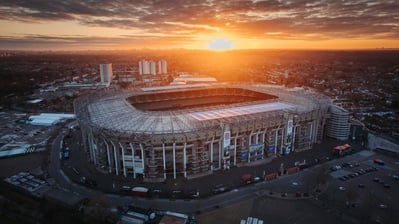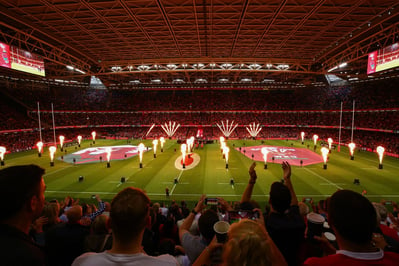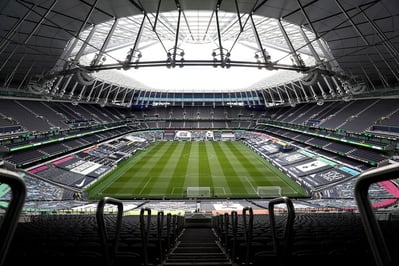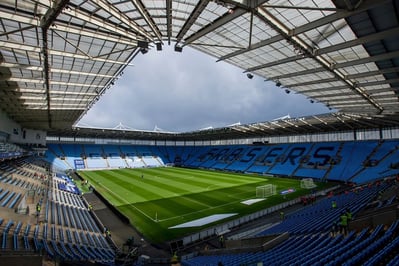In a time when going green is more of a must-do than a maybe, stadiums are stepping up to the plate. These aren't just venues for sports anymore; they are eco-friendly venues for events that want to do more than just impress, but make an impact.
Discover the innovative green strategies these stadiums employ, and how they minimise their ecological footprint. By choosing these venues, event planners can significantly elevate their event's profile, showcasing a commitment to sustainability that resonates with a growing eco-conscious audience.
Allianz Stadium
Allianz (formally Twickenham) Stadium, renowned for its rich history and status as the heart of English rugby, has also established itself as a leader in environmental sustainability.
With an eye for eco-friendly innovation and a dash of ingenuity, this iconic venue is not only scoring points on the field but also in the realm of green initiatives.
Sustainable Initiatives by Allianz Stadium |
Energy Reduction |
Waste Management |
Sustainable Food Practices |
|
Allianz Stadium has significantly reduced operational energy consumption through system improvements, retrofitting energy-efficient solutions, shutting down utilities in unoccupied areas, and providing staff education on reduction practices and policies.
|
Allianz has operated under a "zero waste to landfill policy" for over eight years. Food waste is composted using an anaerobic digestion unit that produces electricity and fertiliser.
Recyclables are sent to a recycling plant, and any unsuitable waste is incinerated to provide energy to the National Grid. |
About 95% of the food is prepared and cooked onsite at Allianz with at least 80% British ingredients. All cooking oil is recycled, and they have a food waste strategy that includes tracking the source, use, and outcome of every ingredient.
Allianz Stadium also regularly donates unusable food to charities. and has introduced carbon labelling on menus, providing details on the carbon impact of each dish. |
Reduction of Single-Use Plastics |
Environmental Accreditations |
Community Engagement |
|
The stadium has significantly reduced single-use plastics with no plastic straws, stirrers or sauce sachets within the venue, as well as introduced 'self-destructing' plastic cups.
Plastic cup event waste is repurposed into sustainable benches for grassroots rugby. |
Allianz Stadium has achieved various sustainability accreditations, including the Green Meetings Silver Award, Gold ECOsmart accreditation, and ISO 14001 Environmental Management Standard.
These recognitions solidify the stadium as an eco-friendly venue option for many planners seeking a greener, sustainable event venue. |
The stadium has been a pillar of the community, investing in several sustainable initiatives.
|
Principality Stadium

In 2010, Principality Stadium in Cardiff employed a Facilities Manager to establish and administer a sustainability policy. In September of the same year, the Welsh Rugby Union, the stadium owners, set out on a mission to make Principality Stadium the UK's first officially recognised sustainable stadium.
With goals to evaluate and improve the sustainability of stadium operations, and improve sustainability communications, Principality Stadium embarked on a series of operational changes. These changes resulted in Principality Stadium achieving their mission, becoming the UK’s first certifiably sustainable event stadium.
Sustainable Initiatives by Principality Stadium |
Waste Management
|
Water Conservation |
Sustainable Operations |
| The stadium segregates all waste for recycling, including dry mixed recycling, compostable food waste, and pitch waste. This approach has significantly reduced waste sent to landfills. | Principality Stadium utilises a rainwater harvesting system below the grass beds of the pitch, recycling water for use. Additionally, infra-red controls are fitted in the urinals to prevent unnecessary flushing. | The plant operations are limited to event days only to reduce maintenance expenditure and energy consumption. All refrigerators in the hospitality lounges have been replaced with efficient A-rated systems. |
Promotion of
|
Community Engagement |
Supplier Engagement |
| On event days, the promotion of public transport is a key operational initiative, reducing the carbon footprint associated with stadium events. |
The stadium has improved communications with key stakeholders such as suppliers and staff to enhance support for sustainability. An internal communications strategy has been developed for staff, involving surveys, training sessions, and newsletters. |
The stadium has engaged with its supply chain to align with its Sustainability Policy, particularly focusing on waste reduction and cost savings. |
Tottenham Hotspur Stadium
Tottenham Hotspur Stadium has implemented a range of sustainable practices, positioning it as a leader in environmental sustainability in sports.
These efforts have earned Tottenham Hotspur top rankings in the Premier League sustainability table produced by the UN-backed Sport Positive and published by BBC Sport, highlighting the club's comprehensive approach to environmental sustainability across various domains.
Sustainable Initiatives by Tottenham Hotspur Stadium |
Renewable Energy and Emissions |
Energy Efficiency |
Sustainable Transport |
| The stadium uses 100% certified renewable energy, including REGO-backed electricity and carbon-neutral gas, contributing to zero scope 2 emissions. Its carbon dioxide emissions are approximately 50% less than those of a stadium built a decade ago, with a target of a 22% improvement on the Building Regulations baseline. | Tottenham Hotspur Stadium’s design emphasises high insulation to reduce heating and cooling demands. It features LED lighting and high-efficiency building systems, as well as intelligent controls and green roofs to further reduce energy use. | The stadium promotes sustainable transport options for both fans and staff. Initiatives include enhanced public transport services, shuttle bus and regional coach services, bike racks around the stadium, and a 'Cycle To Work' scheme for staff. |
Waste Management |
Biodiversity and
|
Community and
|
| The club has a 'zero to landfill' waste management policy and has implemented a reusable beer cup scheme to reduce waste. They provide clear recycling instructions for fans and have made significant efforts to reduce single-use plastics. | The Tottenham Hotspur Training Centre (THTC) has an organic vegetable garden and mini orchard, bug hotels, wildlife ponds, and green roofs to promote biodiversity. The centre uses sustainable practices in managing its grounds and facilities, including water management through boreholes and greywater recovery systems. | Tottenham Hotspur is a founding partner of the global movement 'Count Us In', which aims to mobilise people to act on climate change. The club has also joined the UN Race to Zero initiative, committing to halve its carbon emissions by 2030 and become net zero carbon by 2040. |
Coventry City

Coventry City Football Club has been taking active steps towards promoting sustainability through its venue, the Coventry Building Society Arena.
As part of its commitment towards environmental stewardship, the arena launched a comprehensive sustainability program in 2023, aimed at reducing its ecological footprint and promoting sustainable practices throughout the entire venue.
This initiative represents a significant milestone in the arena's efforts to become a more sustainable and socially responsible organisation.
Sustainability Initiatives by Coventry City |
Sustainable Packaging and
|
Recycling Stations |
Partnership with Go Green |
|
The arena has introduced new, environmentally friendly packaging for food and drink, in partnership with Notpla and Vegware. Notpla provides biodegradable packaging made from seaweed and plants, while Vegware offers cutlery made from sustainable materials like wooden composite or plant-based material. This initiative also includes a switch from plastic sachets to bottled sauces in condiment stations. |
To improve waste management, the arena has added 34 new bins with recycling compartments. This step is part of a broader waste management strategy that has seen the arena recycle more than 95% of its waste. In collaboration with Event Cup Solutions, the arena has also implemented the ONE Planet ONE Chance Reusable Cup System. This system allows fans to use recyclable plastic cups for drinks, which can then be washed and reused at future events. |
The arena has partnered with Go Green to better manage and track all its waste, ensuring proper disposal and recycling processes are followed. |
CO2 Emissions Reduction |
Sustainability Partnership with SKOOT |
Fan Engagement in Sustainability |
|
Efforts are underway to reduce CO2 emissions by consolidating deliveries to decrease the number of trips made and exploring long-term carbon offsetting projects. |
An ambitious partnership with SKOOT aims to make Coventry City FC one of the greenest in the UK. This partnership includes initiatives like tree planting, ocean plastic removal, support for verified carbon projects, and local community engagements. |
The arena has introduced QR codes around the venue to engage fans in sustainability efforts. These codes allow guests to support tree planting and ocean plastic removal, offsetting the carbon emitted from their visit. |
Embracing Digital Solutions for More Sustainable Stadiums
Twickenham Stadium, Principality Stadium, Tottenham Hotspur Stadium, and Coventry City's Coventry Building Society Arena have not only implemented a plethora of eco-friendly initiatives but have also embraced digital transformation with iVvy venue management software.
This software plays a crucial role in streamlining venue management, significantly reducing paper usage by digitalising event run sheets, payments, and ticketing processes. By integrating iVvy's cloud-based technology, these stadiums are not just reducing their ecological footprint but are also enhancing operational efficiency and customer experience.
This holistic approach demonstrates a forward-thinking mindset, where environmental responsibility and technological innovation coalesce to set a new standard for sustainable event management. As these stadiums lead by example, they inspire other venues globally to follow suit, proving that sustainability and efficiency can go hand-in-hand, creating a positive impact on both the environment and events.
.png)

.png?width=3780&height=945&name=Blog%20Banner%20Images%20(21).png)